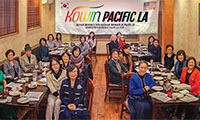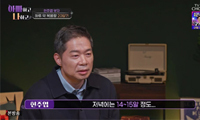▶ Los Angeles Survival
▶ By Ellen Thun
The innkeeper had one child, a daughter with a slight hump to her back. Other people in other countries called it a debutante s slouch: fashionable. But Korean parents did not approve of daughters-in-law with a slouch. The girls name was Simoon. She had passed her 16th birthday; no family had asked for her hand. And not likely in that sparse stretch of country-side on the road to Kanggye, the border garrison town. Military and government officials used the highway, along with border crossers to China. The innkeeper made his profit from them (gambling), so was favorably situated as to the girls dowry.
This visit was to be Chai Soo Dunn s last. The night before he had drunk too much and had a head, as it were. He was wakened by scratchings on the door and Park walked in, bearing the IOUs. Two fistful. It was a cheerful Park speaking. It is time to pay up, honorable brother. The honorable brother growled, Not today. Next time. Park repeated, Today. Before you depart. Waiting for a reply and getting none, he said, I have a plan, and insinuated more to come. Today you can quit yourself of debt. You have only to agree to take my daughter Simoon for your first son s wife. She can go with you today. Chai Soo made choking noises in his throat, he did not believe what he was hearing. The innkeeper continued helpfully, She is a good girl. A hard worker. Her mother has beaten good sense into her. She will not disappoint your wife. Your wife has no plans for First Son? His name is Nak Joon, I believe.
Chai Soo shouted he needed something for his aching head before he could think. Park called out, Simoon! Girl! who appeared. Bring your future father-in-law a dish of kook-mul. Now! She disappeared and returned with the kook-mul, demanding angrily of her father, What about him my future father-in-law? He pushed her out but not before she made a face at Chai Soo. After drinking the gruel Chai Soo made up his mind; it cleared his head. He knew he had heard the last of his wifes tiresome nagging: When will you act to get wives for our sons? One day they will be too old, wait and see. The innkeeper s offer (or demand) was the answer, and should keep her quiet for a while! Chai Soo said to the innkeeper, It s a deal. The IOUs in exchange for my first son.
He made no attempt to quibble breaking the news to his wife. He found her in the kitchen and said, I have good news for you. I have found a wife for Nak Joon. There followed the details, which she did not like. Forgetting herself, she yelled, What are you saying? Are you drunk? He was not drunk, he told her with dignity, and what was she so unhappy about? Hadnt she wanted a daughter-in-law all these years? Her answer: Unhappy! A lowly innkeepers child? Why not the butcher s, shed bring a bigger dowry! Chai Soo threw up his hands. How you talk! You prattle about your God who is love. Who loves all his children. Yet you speak with no love in you! I say, Let us be baptized at once. Become Christian so that God s love will fill your heart. Perhaps then, you will find a place there for the innkeepers daughter. She stopped him. Yobo! she cried. You consent to baptism! and threw herself into his arms. He was a six-footer but he could not disentangle himself to say yea or nay. Hearing loud voices Nak Joon and Nak Chung came to investigate and heard their mothers exclamation, which they echoed, Consent to baptism? as a question. Before Yobo could reply, their mother said, Let us pray, and swept them to their knees, including Chai Soo to whom she still clutched. Her prayers were answered. The family was baptized and Nak Joon had a wife. A good ending is a happy ending. But there is more . . . .
With her family about her Simoon too and her parents who brought her to be wed Chai Soo s wife announced, Call me Abigail. It is my Christian name. No one used it, neither did anyone ask her the reason for the choice. Korean customs are difficult to change. She was Chai Soos wife or Nak Joon s mother, that was the custom. It was my father (Nak Chung), on being asked about his mother, said, She called herself Abigail, and added she was a good woman. Further than that he remained mum. I looked up Abigail in the Bible (1 Samuel 25:3) where it says she was the wife of Nabal the Carmelite, who was churlish and evil . Abigail is described a woman of good understanding, and of beautiful countenance. This biblical Abigail took food to David and his men when they were fleeing from the wrath of Saul. Later, Nabal celebrating his evil ways was struck dumb and died. David then took her for second wife. Did Chai Soos wife know the story in First Samuel? Or was she making a statement about herself? That is, making her self a heroine for her new Oori Aboji. Or identifying with the epochal moment in Korean history (Christianity), anticipating the future Korea? I never met her and know only I was born a Christian because of her baptism in the Old Country sometime in the last half of the 19th century.
Was there ever a country like Korea? I think not. Described a little shrimp caught between fighting whales, swallowed like Jonah inside the whale s belly, its ending fatal. And like Jonah regurgitated to live another day. Abigail did not live to see the demise of her homeland, but she was preparing for that eventuality. She blamed the famines that followed her conversion; the missionaries offered a solution to their hunger. Koreans should immigrate to America where there were plantations that would give them work and a new way of life. God was still with them, she uttered to the farmhouse folks. The occupants had increased. After Nak Joon and Simoon married, they had three sons in succession. Nak Chung was found a wife among Korean orphans fleeing from Pyongyang where the Japanese, 1894-95, were routing China, Big Brother (suzerain) to Korea. Impossible to believe their mentor China, whose language was theirs in poetry and diplomacy, should depart from the land, with the Rising Sun flying everywhere with Japanese soldiers bearing the banners aloft, arrogantly as if already masters of the country. Then there was Russia that had reached the Pacific ocean and nowhere to go, turning southward to the Korean peninsula. Again, 1904-05, the likening to the shrimp caught between whales. Abigail was not to know the next chapter. However, she did live to see more grandchildren. There was Second Sons daughter; he had moved to Koksan to direct the family brassworks. Two sons were born to his family and Whaksiri was sent to live with her grandparents on the farm, she was a handful. She met her match in Kyuang Moo, who was to be known as Jacob when he moved to America. She grew up to marry Cha Hwa Sung, who became governor of Kyangsangdo during the annexation. He died before the end of WWII. Whaksiri and Jacob met briefly in 1946 when he was working with the American Military Government (AMG). That is the way her grandchildren lived, ships passing in the night.
When the king s grain collectors upped the taxes to seven sacks of grain for every 10 produced, the farmhouse was sold and the occupants preparing to go to America. Abigail sickened and died in 1902, the year Koreans were permitted to leave the country. Korean custom for the dead was a three-year period of mourning. The Christians in Korea followed the American custom, one year. So Chai Soo, his sons Nak Joon and Nak Chung with their wives and family, and a teenage fourth son (name unknown), shipped from Japan on the steamship Siberia, reaching Honolulu, late February 1904. Abigails children were now immigrants, a lonely word in a lonely land.
스마터리빙
more [ 건강]
[ 건강]이제 혈관 건강도 챙기자!
[현대해운]우리 눈에 보이지 않기 때문에 혈관 건강을 챙기는 것은 결코 쉽지 않은데요. 여러분은 혈관 건강을 유지하기 위해 어떤 노력을 하시나요?
 [ 건강]
[ 건강]내 몸이 건강해지는 과일궁합
 [ 라이프]
[ 라이프]벌레야 물럿거라! 천연 해충제 만들기
 [ 건강]
[ 건강]혈압 낮추는데 좋은 식품
[현대해운]혈관 건강은 주로 노화가 진행되면서 지켜야 할 문제라고 인식되어 왔습니다. 최근 생활 패턴과 식생활의 변화로 혈관의 노화 진행이 빨라지고
사람·사람들
more많이 본 기사
- 카페 총기난사 한인, 교도소서 피살
- [집중진단/ 복수국적법 절차 문제도 심각] 국적이탈 수속에 2년이나 걸리다니
- ‘옵티머스’ 전 대표 이혁진씨 LA서 사망
- 가주서 ‘스크래처 복권’ 잭팟 대박 잇따라
- 트럼프 “그린란드, 골든돔에 필수…美 아니면 中·러가 가질 것”
- “뉴욕주민 생활비 부담 확 줄이겠다”
- 상·하원서 ‘나토 영토 점령·합병 저지’ 법안 발의
- OC서 ICE 항의 시위 남성 “사망할 뻔”
- “트럼프 사위·특사, 종전협상 교착 속 모스크바 방문 추진”
- 한동훈 제명에 갈등 최고조…張-韓 ‘사생결단 충돌’ 극한분열
- 미 순이민, 반세기만에 첫 ‘마이너스’
- 박나래 前 매니저 “변호사가 시켰다고 말한 적 없어..내달 美서 귀국” [인터뷰]
- 경찰, 김병기 압수수색 했지만…금고 못찾고 아이폰은 잠겨
- 새로 나온 이상한 식품 피라미드
- “팰팍 재정적자 주민들에 전가될 판”
- 현주엽, 충격 근황 “온 가족 정신과 약 복용..子 농구 그만둬”[아빠하고]
- 한국 U23 아시안컵 8강 상대 ‘호주’ 확정... 중국은 D조 2위 진출
- 尹 선고형량은…법조계 “유죄시 중형 불가피, 사형 가능성도”
- “미국인에 사기친 귀화이민자 시민권 박탈”
- 대법, ‘트럼프 관세’ 위법여부 14일에도 선고 안해
- 이재성이 마인츠 살렸다! 2경기 연속 ‘미친 택배’ 도움... 마인츠, 하이덴하임 잡고 드디어 ‘꼴찌 탈출’
- “고소득사업자 위한 절세전략 정보”
- ‘활동중단’ 박봄, SNS 활동ing..건강해진 얼굴색 ‘눈길’
- 뉴저지도 1회용 식기류 제공 금지 눈앞
- 뉴저지한인회, 제123주년 미주한인의날 기념식
- 9월 MD해산물 축제, 마마 덕 상륙
- 한동훈 제명에 갈등 최고조…張-韓 ‘사생결단 충돌’ 극한분열
- 알라딘 서점, 이달말 마당 매장 폐점
- 북VA 남성, 명품시계 가로채려다 경찰에 덜미
- 연방의회서 “한인 위상·한미동맹 제고” 한목소리
- ‘내란 우두머리’ 윤 전 대통령에 사형 구형
- 뉴저지주 ‘안티 ICE(이민자 단속 제한법안)’법안 시행 초읽기
- 월남전 전우산악회 신년하례
- 볼티모어 오리올스, 유격수 루시아노 영입
- 뉴저지한국학교 어린이합창단 한인이민 123주년 행사서 공연
- 변우석→이유미 소속사 “명예훼손·성희롱·인신공격 법적 대응..선처 없다”
- 덴마크, 美회담 앞 “그린란드 주둔군 확대”…스웨덴도 병력 파견
- 당국, 국방부 기밀유출 사건 관련해 WP기자 자택 압색
- ‘슬기로운 부모생활: 미국에서 자녀 키우기’출간
- 박나래 전 매니저, 韓 떠났다..왜?
- 2028 LA 올림픽 티켓 구입절차 공식 돌입
- 미주 한인 이민 123주년 ‘축하’… LA 한인회관 현기식
- 특검, 윤 전 대통령에 ‘내란혐의’ … 1
- 직장생활 풍자 만화 ‘딜버트’ 작가 별세
- 재무 “원화 약세, 韓 강력한 경제 펀더멘털과 부합 않는다”
- 트럼프 “美시민에 사기친 귀화 이민자, 국적 불문 시민권 박탈”
- ‘트럼프 관세정책 역설’… 물가 보다 일자리 ‘직격탄’
- 척 박 연방하원 예비후보, 프라미스교회서 유권자등록 캠페인 지원
- 한국학교 방향성 재정립 모색
- 세리토스시 시니어 서비스
1/5지식톡

-
 한국 안경을 무료 배송으로 받아보실…
0
한국 안경을 무료 배송으로 받아보실…
0안녕하세요. 서울 안암동에 위치한 ‘보고싶다 안경원’입니다.저희는 다년간 한국 고객분들께 착용감 좋은 안경테와 한국안경브랜드,고압축 도수 렌즈를 합리적인 가격에 제공해온 안경 전문점입니다.이번에 해외 배송이 가능해…
-
 미 육군 사관학교 West Poin…
0
미 육군 사관학교 West Poin…
0https://youtu.be/SxD8cEhNV6Q연락처:wpkapca@gmail.comJohn Choi: 714-716-6414West Point 합격증을 받으셨나요?미 육군사관학교 West Point 학부모 모…
-
 ☝️해외에서도 가능한 한국어 선생님…
0
☝️해외에서도 가능한 한국어 선생님…
0이 영상 하나면 충분합니다!♥️상담신청문의♥️☝️ 문의 폭주로 '선착순 상담'만 진행합니다.☎️ : 02-6213-9094✨카카오톡ID : @GOODEDU77 (@골뱅이 꼭 붙여주셔야합니다…
-
 테슬라 자동차 시트커버 장착
0
테슬라 자동차 시트커버 장착
0테슬라 시트커버, 사놓고 아직 못 씌우셨죠?장착이 생각보다 쉽지 않습니다.20년 경력 전문가에게 맡기세요 — 깔끔하고 딱 맞게 장착해드립니다!장착비용:앞좌석: $40뒷좌석: $60앞·뒷좌석 …
-
 식당용 부탄가스
0
식당용 부탄가스
0식당용 부탄가스 홀세일 합니다 로스앤젤레스 다운타운 픽업 가능 안녕 하세요?강아지 & 고양이 모든 애완동물 / 반려동물 식품 & 모든 애완동물/반려동물 관련 제품들 전문적으로 홀세일/취급하는 회사 입니다 100% …
케이타운 1번가
오피니언
 정숙희 논설위원
정숙희 논설위원새로 나온 이상한 식품 피라미드
 데이빗 이그나티우스 워싱턴포스트 칼럼니스트
데이빗 이그나티우스 워싱턴포스트 칼럼니스트 [데이빗 이그나티우스 칼럼] 그린란드에 대한 트럼프의 위험한 집착
 김동찬 시민참여센터 대표
김동찬 시민참여센터 대표 [미국은 지금] 침팬지의 그루밍과 인간의 민주주의
 이명숙 수필가
이명숙 수필가 [수요 에세이] 문화강국
 신경립 / 서울경제 논설위원
신경립 / 서울경제 논설위원 [만화경] ‘구리 박사’ 은퇴설
 노세희 부국장대우·사회부장
노세희 부국장대우·사회부장 먼로 독트린과 돈로 독트린
 민경훈 논설위원
민경훈 논설위원트렌턴, 멜로스, 시실리, 레욱트라
 한형석 사회부 부장대우
한형석 사회부 부장대우 LA 시장 선거 구도와 선택지
 정유환 수필가
정유환 수필가 [화요칼럼] 어머님 전(前) 상서
1/3지사별 뉴스

“뉴욕주민 생활비 부담 확 줄이겠다”
▶ 자동차·주택 보험료, 공공요금 인하뉴욕주가 무상보육 확대와 임차인 보호, 공공요금 규제 강화 등을 올해 주요 역점 정책으로 정하고 뉴욕주민…
‘내란 우두머리’ 윤 전 대통령에 사형 구형

연방의회서 “한인 위상·한미동맹 제고” 한목소리
한인 이민자들이 미국에 도착한 123주년을 기념하고 한인들의 미국 사회에의 기여를 알리는 ‘제 21회 미주 한인의 날’ 행사가 13일 연방의회…
한국학교 방향성 재정립 모색

트럼프 “美시민에 사기친 귀화 이민자, 국적 불문 시민권 박탈”
도널드 트럼프 대통령은 13일 “소말리아든 어디 출신이든, 귀화 이민자 중 우리 시민들을 상대로 사기를 쳐 유죄 판결을 받으면 시민권을 박탈할…
살림으로 뿌리내리다- 테이크루트 안미정 대표의 요리 이야기 (9)




















































.png)


댓글 안에 당신의 성숙함도 담아 주세요.
'오늘의 한마디'는 기사에 대하여 자신의 생각을 말하고 남의 생각을 들으며 서로 다양한 의견을 나누는 공간입니다. 그러나 간혹 불건전한 내용을 올리시는 분들이 계셔서 건전한 인터넷문화 정착을 위해 아래와 같은 운영원칙을 적용합니다.
자체 모니터링을 통해 아래에 해당하는 내용이 포함된 댓글이 발견되면 예고없이 삭제 조치를 하겠습니다.
불건전한 댓글을 올리거나, 이름에 비속어 및 상대방의 불쾌감을 주는 단어를 사용, 유명인 또는 특정 일반인을 사칭하는 경우 이용에 대한 차단 제재를 받을 수 있습니다. 차단될 경우, 일주일간 댓글을 달수 없게 됩니다.
명예훼손, 개인정보 유출, 욕설 등 법률에 위반되는 댓글은 관계 법령에 의거 민형사상 처벌을 받을 수 있으니 이용에 주의를 부탁드립니다.
Close
x